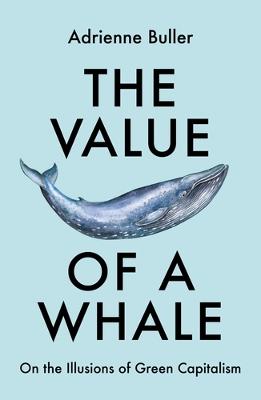
The Value of a Whale
Adrienne Buller
£12.99
Description
Public understanding of, and outcry over, the dire state of the climate and environment is greater than ever before. Parties across the political spectrum claim to be climate leaders, and overt denial is on the way out. Yet when it comes to slowing the course of the climate and nature crises, despite a growing number of pledges, policies and summits, little ever seems to change. Nature is being destroyed at an unprecedented rate. We remain on course for a catastrophic 3 DegreesC of warming. What’s holding us back?
In this searing and insightful critique, Adrienne Buller examines the fatal biases that have shaped the response of our governing institutions to climate and environmental breakdown, and asks: are the ‘solutions’ being proposed really solutions? Tracing the intricate connections between financial power, economic injustice and ecological crisis, she exposes the myopic economism and market-centric thinking presently undermining a future where all life can flourish. The book examines what is wrong with mainstream climate and environmental governance, from carbon pricing and offset markets to ‘green growth’, the commodification of nature and the growing influence of the finance industry on environmental policy. In doing so, it exposes the self-defeating logic of a response to these challenges based on creating new opportunities for profit, and a refusal to grapple with the inequalities and injustices that have created them. Both honest and optimistic, The Value of a Whale asks us – in the face of crisis – what we really value.
This book is relevant to United Nations Sustainable Development Goal 11, Sustainable cities and communities — .
Publisher Review
'Why do so many of the alleged solutions to climate crisis fail to deliver? In this tightly-argued, precise and deeply-researched book Adrienne Buller looks inside the heads of 'green' capitalists, exposing how non-solutions proliferate. Read this brilliant expose if you want to understand not only how some of the world's most powerful people think and act but also how their solutions differ from what is really needed to secure a safe and abundant future for everyone.' Amelia Horgan, author of Lost in Work 'This is a witty, lucid and beautifully written critique of that contradiction-in-terms, 'green capitalism'. It explains why, despite the farcical diminuendo of climate denialism, so little has changed. Its searching inquiry into the puritanical reduction of all living matter to economic value, which underpins most government responses to ecological catastrophe, incisively debunks one of the most dangerous illusions going. This is the book we have long needed.' Richard Seymour, author of The Twittering Machine 'A wonderfully readable attack on the worldview that argues for adding a dollar value to nature in order to save it. An accessible account of a new phase of capitalism that we all need to understand.' Professor Simon Lewis, author of The Human Planet 'At last! A wonderfully refreshing antidote to the notion that market forces can solve the climate and nature crises, and the deadly assumption that every idea must be evaluated in terms of markets, finance, property or profit. Elegant, incisive and fierce, Buller systematically takes apart the false solutions that dominate mainstream analysis, from carbon offsets to the commodification of nature, and gives us the tools to challenge their dominance and to broaden our understanding of what's both possible and necessary.' Caroline Lucas MP 'Buller offers essential context for understanding how economic dogmas and market-driven statecraft have warped our understanding of and responses to the climate crisis-or lack thereof. Crucially, she also presents a practical roadmap for course-correction. The Value of a Whale is an accessible and expertly curated guide to the increasingly slick, green face of capitalism in the 21st century. This book should be required reading for everyone from climate activists to policymakers and concerned citizens looking to salvage our collective prospects for a liveable future.' Kate Aronoff, author of Overheated 'This is a book for anyone troubled by our lack of progress on the climate crisis, from young activists to hard-headed CEOs and investors that face losing control of companies as the climate breaks down. In her persuasive analysis of net zero policies that narrowly prioritise efficiency, market pricing and offsetting - and with unusual clarity and scrupulous integrity - Buller comes to unsettling conclusions. Read this before it is too late.' Ann Pettifor, author of The Case for the Green New Deal 'The Value of a Whale is an urgent and honest intervention, casting a magnifying glass over the institutions, insider groupthink, and non-solutions distracting and deflecting from the radical ideas and compassion we need to secure a safe planetary future. For too long, our response to ecological crisis has been steered by mainstream economic thinking that is not fit for purpose, to the exclusion of other vital perspectives. As Buller compellingly argues, we are long overdue a reset.' Farhana Yamin, Visiting Professor at UAK, Associate Fellow, Chatham House 'A sorely needed corrective in an era of climate politics dominated by dollars and models. Adrienne Buller's The Value of a Whale is critical reading for the important task of prying the future out of the hands of corporations and technocrats.' Olufemi O. Taiwo, author of Elite Capture and Reconsidering Reparations 'In this well-researched book, Buller forensically sets out the case against some common non-solutions - or certainly solutions that are leaned on too heavily.' Jeremy Williams, The Earthbound Report 'The seriousness of climate change cannot be over-stated. Yet after decades of UK policy-makers paying lip service to pro-environment policies, sadly it does seem that the next Prime Minister will be, at best, indifferent to climate change, and at worst, openly hostile to the notion that we must transform our economy to address it. Adrienne Buller's outstanding book, however, perhaps helps us to understand why that might be the case.' Craig Berry, The Political Economy Blog -- .
Book experts at your service
What are you looking for?